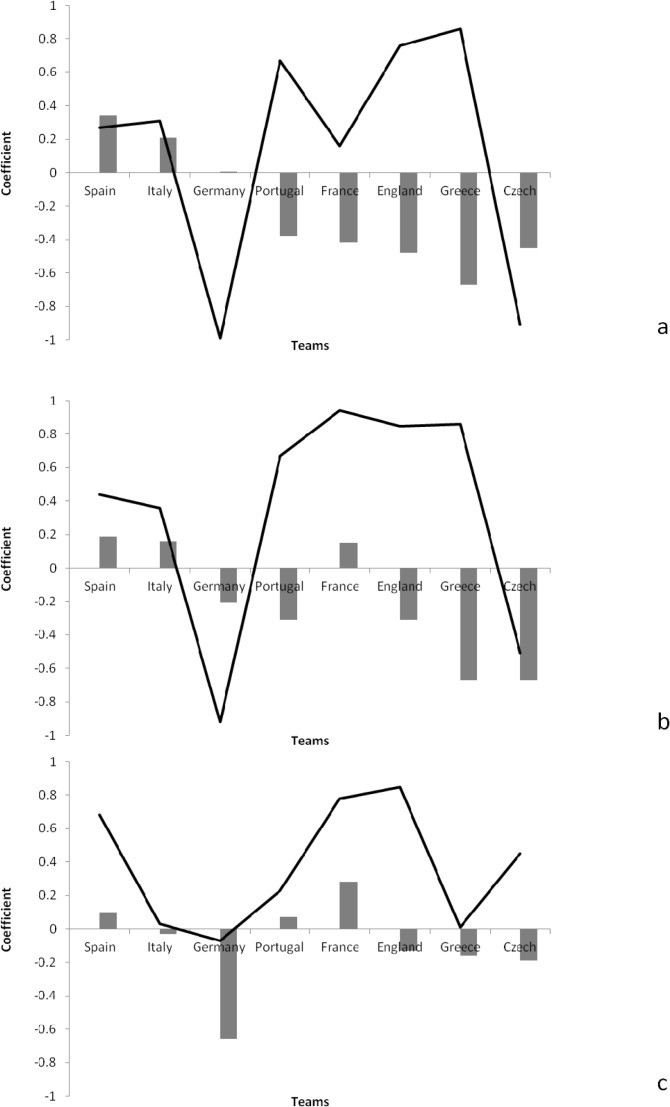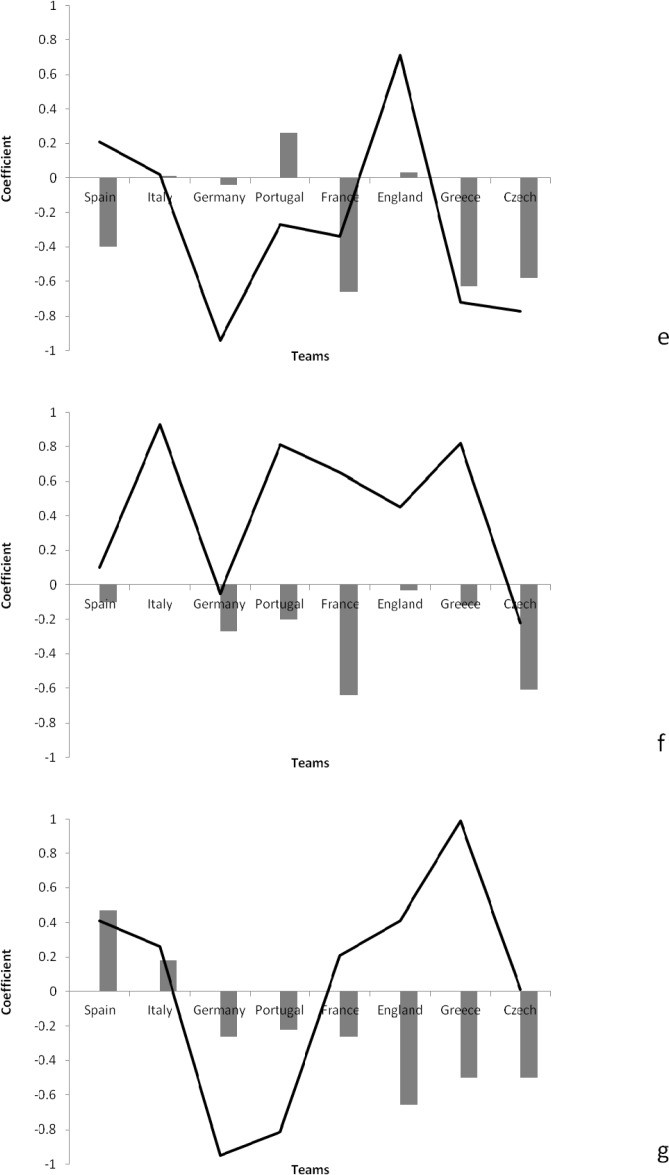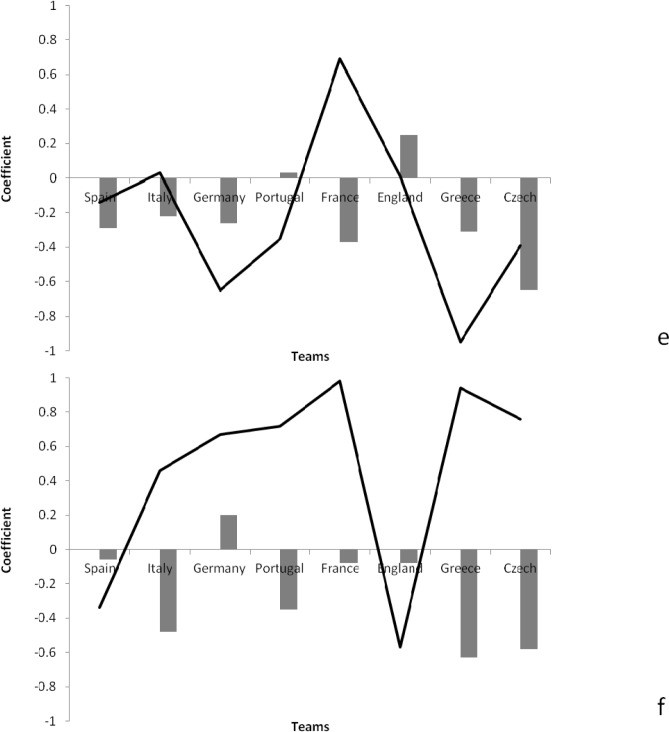The UEFA Euro 2012 tournament, hosted by Poland and Ukraine, showcased some of Europe’s top national soccer teams. While individual match brilliance can capture headlines, sustained success in a tournament format demands consistency. A detailed analysis was conducted on the performance of the teams that reached the quarter-finals of Euro 2012 to understand the role of consistent performance in achieving positive match outcomes. This article dives into the findings, revealing which performance indicators truly mattered and highlighting the teams that demonstrated the most consistency throughout this prestigious competition.
Decoding Performance Consistency in Euro 2012’s Elite Teams
To truly understand what separated the top teams at Euro 2012, a study focused on the eight squads that progressed to the quarter-finals and beyond: Spain, Italy, Germany, England, Portugal, France, Czech Republic, and Greece. The research meticulously analyzed sixteen key performance indicators across all their matches, from the group stage to the final. These indicators were categorized into goal-related, offensive-related, and defensive-related metrics to provide a comprehensive view of each team’s play.
Performance Indicators Under Scrutiny:
- Goal-related: Total shots, shots on target, and shot accuracy.
- Offensive-related: Ball possession, total passes, pass accuracy, long passes, crosses, cross accuracy, and corners.
- Defensive-related: Tackles, tackles won, interceptions, clearances, duels won, and aerial duels won.
By employing autocorrelation and cross-correlation statistical methods, the study aimed to measure the consistency of each team’s performance across successive matches and the relationship between these performance indicators and match results (win, draw, or loss). Autocorrelation helped identify teams that maintained a stable level of performance in specific indicators from one game to the next. Cross-correlation, on the other hand, revealed how strongly each performance indicator was associated with the outcome of a match.
How Euro 2012 Teams Stacked Up: Average Performance Metrics
Before diving into consistency, it’s important to see how these top Euro 2012 teams compared on average across the sixteen performance indicators. Spain and Italy emerged as leaders in numerous categories, reflecting their eventual final match-up. Germany and Portugal also showed strengths in specific areas, while the Czech Republic and Greece lagged behind in most metrics.
| Performance Indicators | Spain | Italy | Germany | Portugal | France | England | Greece | Czech Republic |
|---|---|---|---|---|---|---|---|---|
| Shot | 15.83 | 16.83 | 13.5 | 15.5 | 16.25 | 10 | 7.33 | 12.33 |
| Shot on target | 6.66 | 5.33 | 5 | 4.25 | 5.5 | 2.75 | 1.66 | 4.33 |
| Shot accuracy (%) | 51.26 | 45.43 | 45.72 | 33.87 | 47.2 | 34.77 | 30.53 | 43.86 |
| Possession (%) | 65.28 | 51.33 | 54.9 | 39.85 | 54 | 40.65 | 43.33 | 51.53 |
| Duel won (%) | 55.93 | 48.55 | 56.7 | 48.8 | 45.85 | 51.55 | 52.55 | 47.13 |
| Aerial duel won (%) | 58.83 | 43.18 | 57.27 | 46.5 | 51.25 | 47.6 | 53.96 | 57.13 |
| Interception | 12.33 | 23.5 | 15.25 | 17.5 | 14.75 | 17.75 | 21.66 | 7 |
| Corner | 6.66 | 4.83 | 6.25 | 7.5 | 7 | 4 | 3 | 5 |
| Total pass | 676.6 | 461.5 | 517.5 | 324.75 | 511 | 353.5 | 323 | 420.3 |
| Long pass (%) | 7.06 | 10.91 | 8.62 | 14.35 | 9.22 | 11.62 | 16.5 | 12.16 |
| Pass accuracy (%) | 88.46 | 82.35 | 85.75 | 76.42 | 86.87 | 80.40 | 76.5 | 80.43 |
| Cross | 13.66 | 15.16 | 24.5 | 22.5 | 19.25 | 17.75 | 18.33 | 16 |
| Cross accuracy (%) | 23.45 | 30.93 | 23.5 | 15.95 | 25.25 | 25.57 | 14.93 | 23.26 |
| Tackle | 19.33 | 15.5 | 18.75 | 14 | 16.5 | 20.5 | 16.33 | 13.66 |
| Tackle won (%) | 79.48 | 73.4 | 76.42 | 70.4 | 77.4 | 73.2 | 80.1 | 77.66 |
| Clearance | 16.33 | 22.33 | 15.5 | 16.75 | 18.75 | 24.25 | 29.33 | 19 |
Note: Bold values indicate the first and second ranked teams in each performance indicator.
This table provides a snapshot of average performance, but consistency tells a deeper story.
Consistency in Goal-Scoring Indicators: Spain and Italy Lead the Way
 Figure 1
Figure 1
Analyzing the autocorrelation of goal-related indicators revealed interesting insights. Spain and Italy exhibited positive autocorrelation for shots, meaning they maintained a relatively consistent number of shots per game throughout the tournament. Spain also showed consistency in shot accuracy. This suggests that these two finalists were not just occasionally brilliant in front of goal; they consistently created and converted chances.
Interestingly, cross-correlation analysis, which links performance indicators to match results, showed that while Spain had a positive correlation between shots and match results, France demonstrated a stronger association in goal-related indicators with match outcomes. This implies that for France, goal-related performance was more directly tied to winning or losing, even if their consistency across matches wasn’t as high as Spain’s. England, Portugal, Italy and Greece also showed positive cross-correlations between shots and match results, highlighting the fundamental importance of goal attempts in determining success.
Offensive Consistency: Spain and Italy’s Passing Prowess
 Figure 2
Figure 2
In offensive metrics, Spain and Italy again demonstrated notable consistency. Both teams showed positive autocorrelation in ball possession and total passes, indicating their commitment to a possession-based style of play throughout Euro 2012. Spain further stood out with consistency in corners won.
Cross-correlation analysis revealed that England, France, and Italy showed a positive relationship between ball possession and match results. This suggests that for these teams, controlling possession was a significant factor in securing wins or draws. Germany and Spain demonstrated a positive cross-correlation between pass accuracy and match results, highlighting the effectiveness of precise passing in their game plans.
Defensive Consistency: Aerial Duels for Spain, Tackles for England and Portugal
 Figure 3
Figure 3
Defensively, Spain and France displayed consistency in aerial duels won, suggesting a stable approach to challenging in the air. England and Portugal showed consistency in tackles won, indicating a persistent effort to regain possession through tackling.
Cross-correlation in defensive indicators revealed France, England, Greece, and Portugal all had positive correlations between various defensive metrics and match results. France demonstrated this in duels won, England in interceptions, tackles won, and clearances, Greece in duels won, interceptions, tackles made, and clearances, and Portugal in interceptions, tackles, and tackles won. This highlights that different defensive aspects were crucial for different teams in achieving favorable outcomes.
The Consistency Factor: A Key to Tournament Success
The study’s findings strongly suggest that consistency was a significant factor differentiating the successful teams in Euro 2012. Spain and Italy, the finalists, exhibited greater performance consistency across a range of indicators, particularly in goal-related and offensive categories, compared to other quarter-finalists.
While some teams might have had individual matches with higher peaks of performance, Spain and Italy’s ability to maintain a consistently high level across multiple games proved crucial. This reinforces the idea that in international tournaments, where teams face a series of challenging matches in a short period, consistency can be more valuable than occasional brilliance.
The research supports previous studies emphasizing the importance of goal-related and offensive indicators like shots, shots on target, and ball possession in soccer success. However, it adds a layer of understanding by highlighting the significance of consistency in these indicators within a tournament context.
It’s important to note that while this study focused on Euro 2012, the specific performance indicators that correlate with success might vary across different tournaments and levels of soccer. Tactical approaches and the overall playing styles can evolve, influencing which metrics become most critical. Further research across different international tournaments and club competitions could provide a more comprehensive understanding of performance consistency and its impact on soccer success.
Implications for Soccer Coaching and Strategy
The findings of this Euro 2012 analysis offer valuable insights for coaches at all levels of soccer. The emphasis on consistency suggests that developing tactical approaches that teams can reliably execute game after game is paramount for tournament success. While adapting to opponents is essential, having a solid foundation of consistent performance in key areas like creating scoring opportunities, maintaining possession, and effective defending can significantly increase a team’s chances of achieving positive results throughout a tournament. Focusing on building consistent team habits and strategies, rather than solely chasing peak performances, may be the true pathway to sustained success in international soccer.
